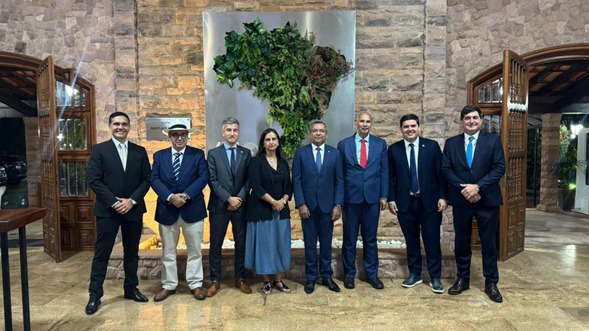This year, 200 agricultural specialists will be trained in Mexico and in their countries of origin, in areas such as plant health control and water and soil conservation, among others.
Mexico City, 13 January 2015 (IICA). In 2015, the Government of Mexico will be adding the Central American countries to its agricultural capacity-building program that is already being carried out successfully in the Caribbean, with support from the Inter-American Institute for Cooperation on Agriculture (IICA).
Currently under way in 15 Caribbean countries, the program will also be implemented in the Central American nations, after the ministries of agriculture of those countries expressed interest in being involved in future actions, announced Víctor M. Villalobos, Director General of IICA. “This expansion will help strengthen agriculture in the Americas,” he added.
In presenting a report on the Capacity Building Program to Promote the Development of Agriculture at a meeting involving the agricultural authorities of Latin America and the Caribbean, Villalobos highlighted the results of the first phases of the work.

He explained that the training provided had made it possible to promote the development of agriculture in the Caribbean and position Mexico as a strategic partner in South-South cooperation, based on the capacity, talent, and experience of educational and research institutions in Mexico’s agricultural sector.
Villalobos also explained that the program had made it possible to identify productivity models that could be replicated in the economies of the Caribbean countries in relation to six key issues: protected agriculture, water conservation, family agriculture, sheep production, plant pathology, and rural tourism.
The work consists of both theoretical and practical courses and technical follow-up, with 295 people having taken part so far.
The training is provided by Mexican scientific and academic institutions such as the Centro Regional de Servicios Integrales para la Agricultura Protegida (CRESIAP), the Centro de Investigación Científica de Yucatán (CICY), the Universidad Autónoma de Chapingo (UACH), the Instituto Mexicano de Tecnología del Agua (IMTA) and the Colegio de Postgraduados (COLPOS).
In 2015, IICA intends to focus the program on subjects such as animal and plant health control in ports and at airports and border posts, biotechnology and genomics, water and soil conservation, family and backyard farming, rural tourism and protected agriculture.
The plan is to train 200 technical officers, in Mexico and other countries, with a view to improving the agriculture of the 21 nations taking part. The courses will be tailored to the needs of each country.
The program is being carried out under a cooperation agreement between Mexico’s Secretariat of Agriculture, Livestock, Rural Development, Fisheries, and Food (SAGARPA) and IICA, signed on 29 April 2014 in Yucatán during the Third Mexico-Caribbean Community (CARICOM) Summit.
More information:
gloria.abraham@iica.int











